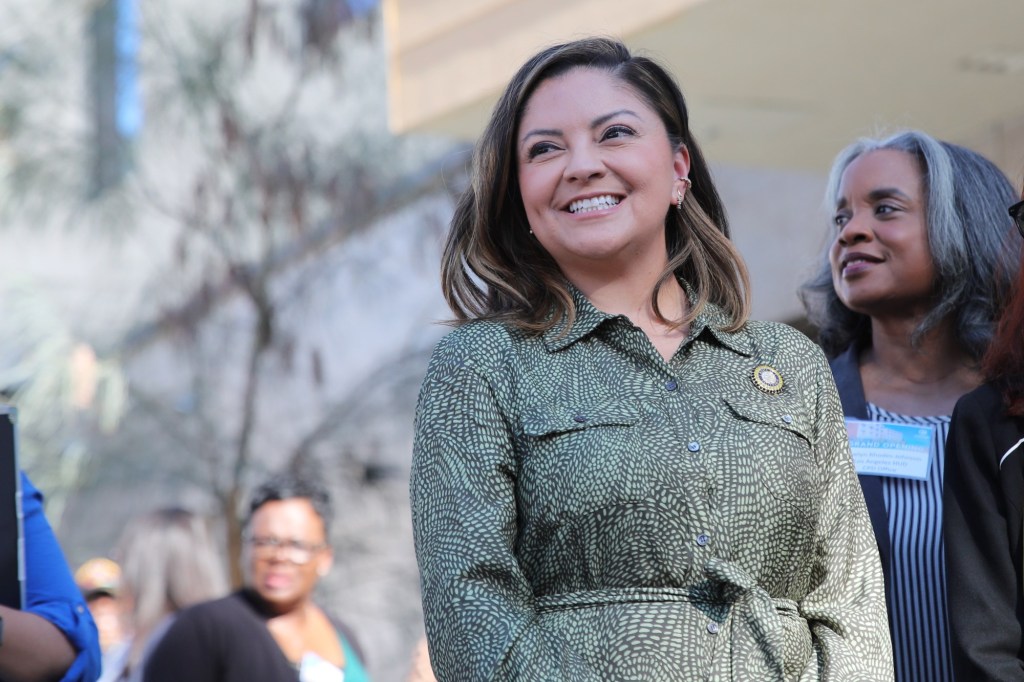
An enrollment freeze and other possible changes to health care coverage for undocumented immigrants through the state’s Medi-Cal program, proposed by Gov. Gavin Newsom to help balance the budget, have put the Democratic governor at odds with members of his own political party.
During his revised budget presentation earlier this month, Newsom laid out a proposal to pause new sign-ups to Medi-Cal, the state’s version of Medicaid, for low-income immigrants without legal status beginning next year, and to charge adults with “unsatisfactory immigration status” a $100 monthly premium starting in 2027.
These changes would save the state about $5.4 billion by the 2028-29 fiscal year, according to the governor’s office.
The proposed changes, in addition to other health care-related changes that would also impact undocumented immigrants, come as the state grapples with a $12 billion deficit. Newsom has blamed President Donald Trump’s tariff policies and other actions by the Trump administration for California’s declining fiscal health.
But some in Newsom’s own political party are pushing back on the Medi-Cal changes the governor is seeking, including members of the California Latino Legislative Caucus.
Sen. Lena Gonzalez, D-Long Beach, who chairs the caucus, said during a press conference this week that undocumented immigrants have contributed billions in state taxes. Her office later shared a report by the California Budget & Policy Center, which said that undocumented immigrants paid nearly $8.5 billion in state and local taxes in 2022.
“And what is their return on investment? Shutting them out of health care, a basic right?” Gonzalez said. “We’re OK saying that we’re the fourth largest economy. … But who are we the fourth largest economy on? Who are we on the backs of? It is immigrant communities.”
Sen. Caroline Menjivar, a Democrat from the San Fernando Valley, said during that news conference that if one did not know the suggested changes to Medi-Cal were floated by Newsom, one would think they had been proposed by “a Republican in perhaps Alabama.”
As the daughter of Salvadoran immigrants whose mother is on Medi-Cal and who has relatives who are undocumented or who have temporary protected status, Menjivar said the proposed Medi-Cal changes are personal to her.
Menjivar pushed back on narratives that immigrants are to blame for the state’s budget deficit. Instead, she said, part of the problem is that businesses aren’t providing livable wages or are not employing workers full time, thus forcing people to rely on Medi-Cal.
She then expressed opposition to the proposed changes to Medi-Cal coverage for undocumented immigrants.
“Gov. Newsom, this is not the solution. There are other ways. We’re saying no to these Medi-Cal cuts,” Menjivar said.
In discussing the proposed changes when he unveiled his revised budget proposal for the 2025-26 fiscal year, which starts July 1, Newsom said the Medi-Cal enrollment freeze doesn’t mean the state is backing away from its support of immigrants.
“No state has done more than the state of California, no state will continue to do more than the state of California by a long shot. And that’s a point of pride,” he said.
People without legal status who are already enrolled in Medi-Cal won’t be kicked off their plans, and children won’t be affected by the changes, according to Newsom’s plan.
Last year, California extended health care benefits to all low-income adults, regardless of immigration status. But that move cost the state $2.7 billion more than Newsom’s administration had expected. Over 1.6 million people without legal status are enrolled in Medi-Cal this year.
Just as members of Newsom’s own party have been critical of aspects of his revised budget proposal, Republicans have been quick to point out where they feel the governor has erred.
State Sen. Tony Strickland, R-Huntington Beach, talking about the state’s expanded Medi-Cal coverage to undocumented immigrants last year, said Newsom “should never have promised that money in the first place, knowing that we did not have the resources.”
Fernando Guerra, a political science professor at Loyola Marymount University, said every legislator and caucus will have their own ideas about what should be cut or saved in a budget, and it’s to be expected that there will be “more losers than winners” during a difficult budget year.
As for the upcoming fiscal year specifically, Guerra said it would be impossible to make up a $12 billion deficit without making cuts in the areas of education or health and human services — the two largest pieces of the state budget pie.
The question, he said, is how much and to what degree?
“This is just the opening salvo where people are starting to make their arguments,” Guerra said about the ongoing budget negotiations between the governor and state legislature, which only kicked off in earnest less than two weeks ago.
“But at the end of the day, there will be cuts in the health care area,” Guerra predicted.
During the Latino Legislative Caucus press conference, Gonzalez acknowledged that legislators must look at cost containment and expressed confidence they’ll come up with alternative solutions to balance the budget.
“We’re a smart enough bunch. We have two health (community) chairs that are in the Latino caucus. We can get this right. But we should not single out and sensationalize life-saving health care that serves our hardest-working Californians,” she said.
The legislature has until June 15 to send a budget to the governor, who then has until the end of June to sign it.
The Associated Press contributed to this report.



